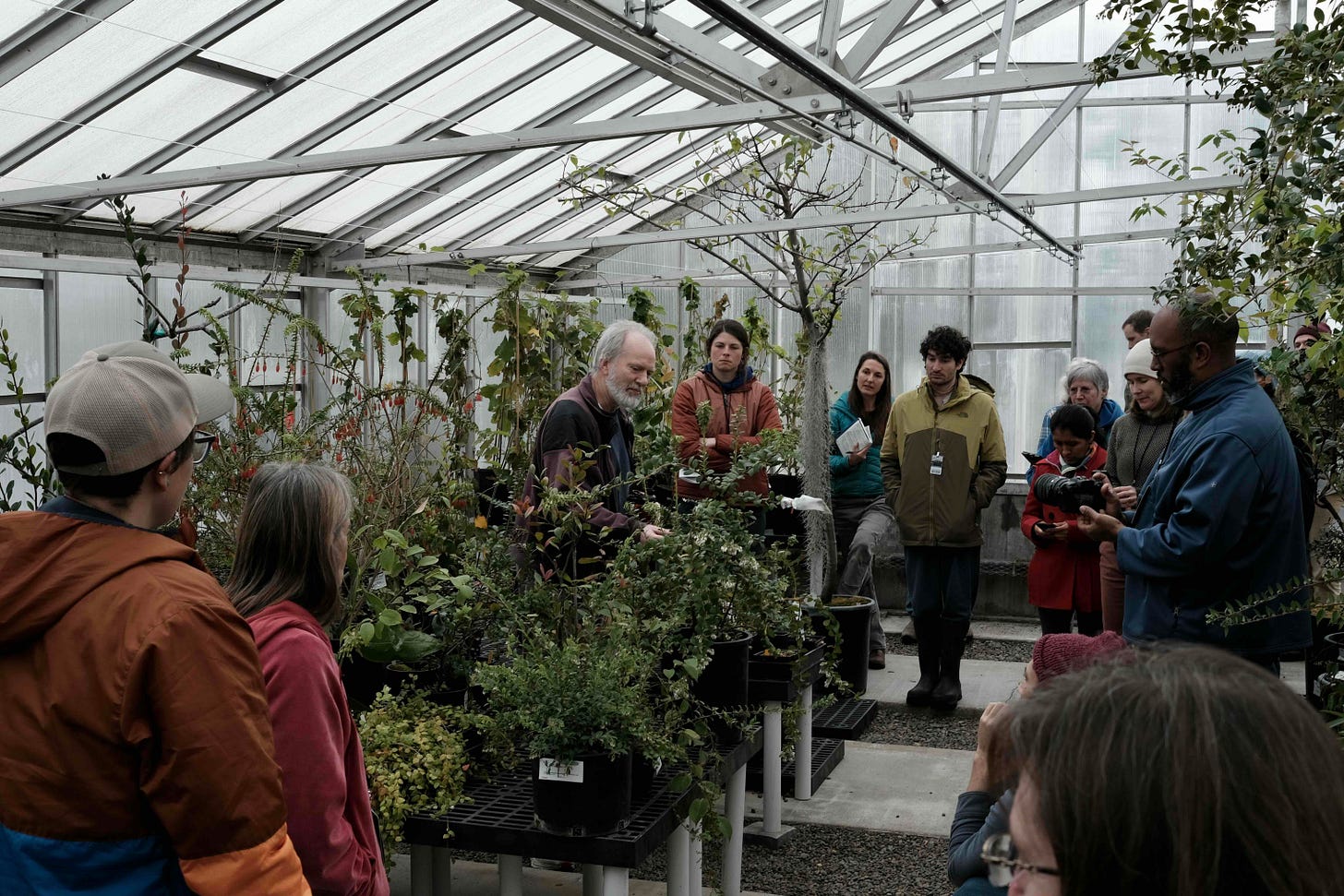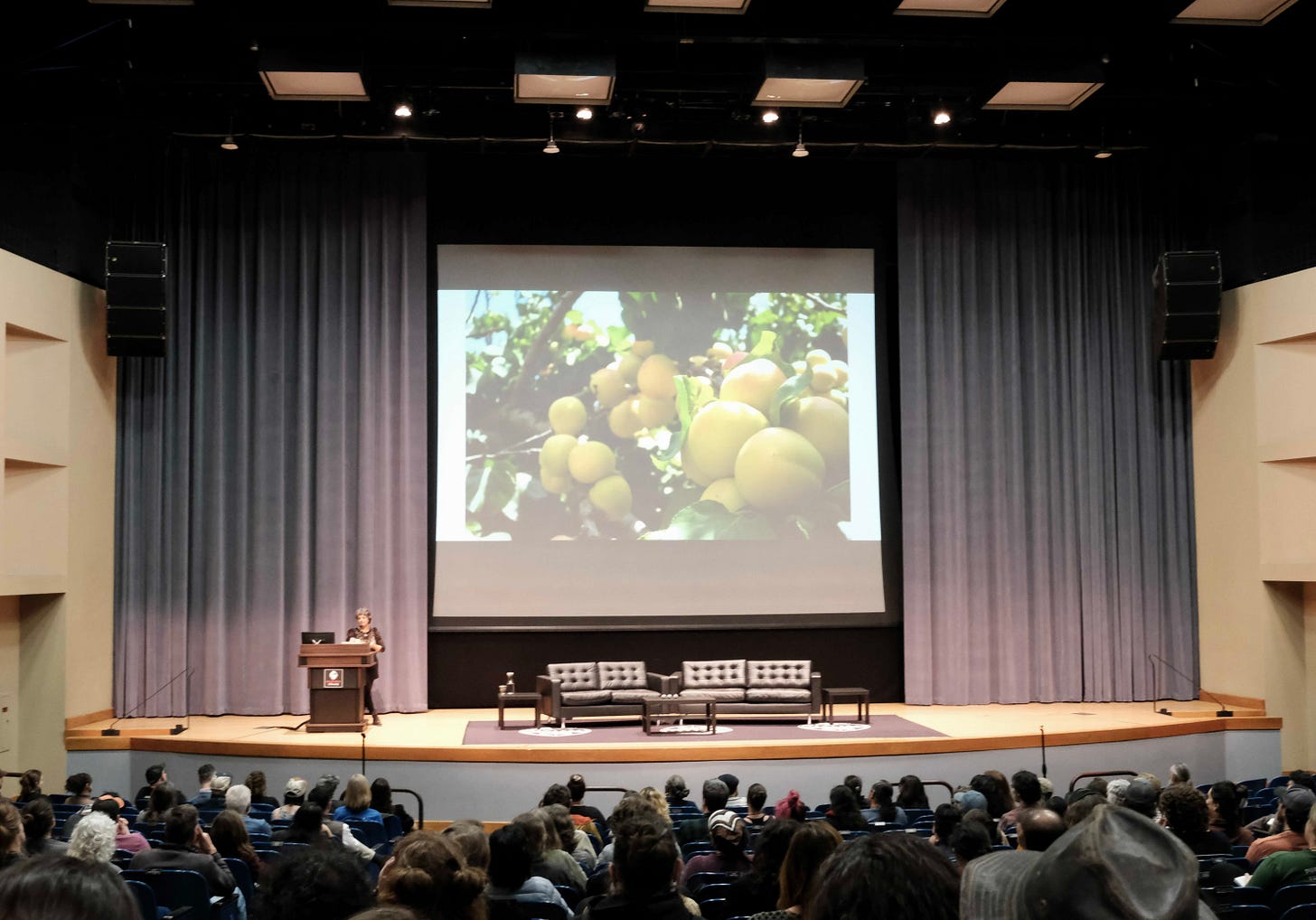The Organic Seed Growers Conference (OSGC), organised by the Organic Seed Alliance, is the largest event focused solely on organic seed in North America, bringing together hundreds of seed growers, plant breeders, researchers, students, seed companies, food companies, policy advocates and others from across the U.S and around the world.
I had originally planned to attend the OSGC during my Churchill Fellowship travels last year, but the 2024 conference was postponed. So it was with much excitement that I made the journey back to Oregon in February to attend the event in 2025.
The conference takes place over several days, with optional pre-conference symposiums and farm tours in the lead up to the main event, followed by two jam packed days of workshops, panel discussions and presentations at the conference itself. This year’s theme - weaving visions of organic seed communities - served as an invitation to strengthen the connections that sustain this seed movement while honouring the distinct yet interwoven histories and collective wisdom of seed stewards around the world.
Wanting to make the most of my time back amongst this inspiring community, I was up bright and early on the Thursday morning to catch the bus for the pre-conference farm tours. The schedule for the day took us to many businesses and organisations involved in seed work: from the department of Plant Breeding and Genetics at Oregon State University, to the National Clonal Germplasm Repository, to brand new seed farm Summertime Seed and ending the tour at established seed company Adaptive Seeds. Visiting all of these places in one day reminded me of the proliferation of seed work that occurs in this area. In just one day, we got a behind the scenes glimpse into the huge diversity of jobs and skills required to really keep this seed movement alive, meeting some of the dedicated folks who make it all happen. It brought back the sense of abundance that I so keenly felt during my time here last summer. But what was also very apparent this time round was the growing sense of urgency to do this important work.
With the shifting social and political landscape, many of the places we visited during the tour are currently under threat; through loss of funding, contracts or staff. The impacts of the new administration in the U.S are being felt throughout this farming community. It would be easy to become despondent faced with so many challenges. But rather than succumb to despair, the mood amongst folks that day, and in fact throughout the entire conference, was once of strength and resistance. Seed work is vital work, and those that are involved in it are deeply committed to what they do. As quoted in one of the opening conference sessions: to deny somebody seed is to deny someone existence. This conference - centred around sharing, community and collaboration - felt like a powerful act of resistance in itself. A passionate retaliation against the current political discourse of uncivilization that favours the individualist mindset, and a hierarchical and purist narrative.
And community was definitely at the heart of the Organic Seed Growers Conference, with a programme that covered everything from seed production to policy to seed stories - it is weaving a stronger movement and tightening our bonds through the threads that connect us. As Vivien Sansour shared during one of her panel discussions- ‘seeds have been saving us for millennia’. In bringing us together at this conference, seeds are continuing this great undertaking. By intentionally creating a space to listen to each other, to share seed stories, to better understand our histories and our trauma, seeds offer us a path to healing and to forging new ways of being together.
During my time at the conference, I was invited to share my own seed story at the second keynote session - the inaugural Seedy PechaKucha. An exciting spin on the usual keynote format, 6 of us were allocated 400 seconds each to share our seed focused stories, with the aid of 20 slides that auto advance every 20 seconds. Although initially terrifying, this ‘chit chat’ style of presenting turned out to be a lot of fun, and I felt grateful for the trust and support from my fellow PechaKucha crew. I took this opportunity to share how my seed community back home are sowing the seeds of resistance – through the Seed Sovereignty Programme’s Crowd Breeding Project.

The Crowd Breeding Project is a participatory plant breeding project aimed at collectively curating diverse populations of crops. It was inspired by many projects in the US and Canada, and seeks to restore diversity to our seed system and empower and inspire farmers to engage in the process of plant breeding. One of the most powerful and unexpected outcomes of this project so far has been the community that has emerged; working collaboratively has offer the opportunity for solidarity & support between a group of farmers spread throughout the British isles, and it was a privilege to share this story with fellow seed growers across the Atlantic. Like the Organic Seed Growers Conference, the Crowd Breeding Project is nurturing a culture of diversity and belonging.
As K Greene shared during the Non Binary Botany session, ‘plants are part of how we take care of each other’. They facilitate a mutual flourishing.
Alongside the scheduled conference programme, there were also plenty of features and events running throughout the two days: a highlight being the mini Variety Showcase, curated by Lane Selman of the Culinary Breeding Network. Much like the Variety Showcase I attended back in September, Lane brought folks from this community together over delicious culinary bites that showcased innovative plant breeding and seed work. What felt unique about hosting the showcase in this specific context, however, was the captive audience. Everyone there had a vested interest in seed work, and this amplified the celebratory vibe – a wonderful moment to truly revel in each others hard work and sample the rewards of intentional seed stewardship. I was offered the chance to showcase the work of the Gaia Foundation Seed Sovereignty Programme at the event, and shared stories of more of the amazing seed work happening in the UK and Ireland, albeit without any delicious snacks to share!
From the work of the Open Source Seed Initiative, to reflections on seeds in diaspora, to the importance of the threshing stick! I learnt so much during my time at the Organic Seed Growers Conference, and was once again astonished by the generosity of this community, and all those who shared their experience, skills and knowledge. Towards the end of the conference, during the small seed company round table on the Saturday afternoon, Andrew Still from Adaptive Seeds flipped the script and posed the audience an important question– ‘why did you get into seed work?’ It feels like we’re not often asked to reflect on why we make the choices we do. For me, seed work is fundamental, and I cannot imagine not doing it. But when encouraged to probe deeper and really reflect on why it is I continue to do what I do, what comes up for me is connection. There is the connection between me and the plants that will grow. Between my ancestors who held seeds in their hands, planting them deep in the earth. But also the connection to those who I collaborate with in the present moment, like all of the folks I spent time with at this wonderful event. And my community back home, collectively stewarding seed on its journey beyond our lifetimes. But more than that, seed work offers a connection to the wider cycles of life and the millions of more than human beings that work together to allow these crops to thrive. To the myriad of interactions that occur every second determining how that seed will germinate and grow. Seed work reminds me how everything is intrinsically connected and in relationship.
In a world filled with disconnection and isolation, where our attention is pulled in multiple directions at once, seed growing asks us to slow down, to connect and be present in the moment. I like to think this has a ripple effect, impacting how we move through the rest of our lives, defining the space we make for each other, how we listen and share.
Caring in our own sphere of influence.








